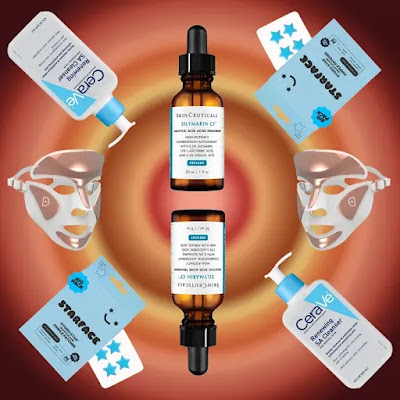Night Masks vs. Night Creams: What’s the Difference and Which One Should You Use?
There’s no denying that we’re spoilt for choice when it comes to skincare. This often leads to a struggle to find a routine that’s right for you and your skin type. Things can get a little tricky when trying to figure out what the difference is between products that sound basically the same. Don’t panic, we’re going to get to the bottom of it and take a look at what night masks and night creams are, how they differ, and which one is best to use.
What is a Night Mask?
A night mask works on the same principles as a regular face mask, with the main difference being that, as you might guess, a night mask is something you wear overnight. Packed with active ingredients that transform your skin and address all of your concerns, like aging, dullness, and fighting breakouts. You’ll also find night masks come in lightweight or gel formulas that are perfect for nearly all skin types. A night mask, also known as a sleeping mask, is a highly effective skincare mask that nourishes your skin while you sleep. This allows the powerful blend of skin-boosting ingredients to absorb into the skin and penetrate the underlying layers without having to fight the environmental aggressors our skin comes in contact with every day, like free radicals, pollution, and UV damage.
Many skincare experts believe that night masks containing ingredients such as hyaluronic acid, lactic acid, retinol or niacinamide work best on the skin while we sleep. This is because while we sleep, our skin can recover and repair any damage during the day, which allows the product to increase its effectiveness and you really notice a difference in the morning.
Can I use a night mask every night?
It really depends on what active ingredients are in the night mask. For example, regular exposure to chemical peels can cause the skin to become sensitive to UV rays, which means the skin can become inflamed and red. If you use a night mask, think of it more as a treatment product than an important step in your nighttime skincare routine. How to avoid overusing a sleeping mask, which can cause skin reactions and tightness.
What is a night cream?
Night creams are usually thicker and creamier formulas than night masks, and are able to absorb into the skin throughout the night. These creams are not as effective as night masks, so you can use them as part of your daily skincare routine. Night masks usually contain ingredients that are not recommended for daytime use, such as: B. Retinol, allowing them to fully penetrate the skin and make a noticeable difference in the overall look and feel of your complexion.
When is the best time to apply night cream?
It can be difficult to know the best time to use a night cream, especially since many of us go to bed at different times at night. It is recommended to apply a night cream before going to bed, preferably between 10 and 11 pm. Here is an example of a good nighttime skincare routine that will benefit your night cream and increase its effectiveness:
Remove all traces of makeup with makeup remover or micellar water
Cleanse your skin with a non-foaming cleanser to remove any product residue and residue
Use a cotton pad soaked with acid toner to wipe your face, avoiding the eye area and removing the buildup of dead skin cells
Dab your serum of choice onto your skin
Finally, apply your night cream. Your skin should feel gooey while you go to bed
Do I really need a night cream and a night mask?
It’s not really necessary to use both products in your daily routine, but it’s a good idea to alternate between a few to keep your skin looking and feeling as healthy as possible. If you find yourself with multiple issues, such as: If you have dullness, uneven skin tone, and signs of aging like fine lines and wrinkles, then using a night cream regularly will help address these issues and reduce these signs within 6-8 weeks. When you use a night mask, you have the freedom to choose when to use it, making it a more effective treatment product. It is perfect to use when you feel your skin needs something, such as: B. Extra boost of hydration and brightening.
Should I use a night mask or a night cream?
It really depends on your personal preference. If you find some signs of aging or other skin issues that can be treated with a daily night cream, then this is the best option for you. Remember to consider your skin type. For example, oily skin does not like heavy creams because this can lead to clogged pores. pores, acne, and blackheads.
Whichever product you choose, you will notice the appearance of wrinkles, firmer skin, and a brighter, clearer complexion.
Is there really a difference between day and night creams?
As you know by now, there are actually a lot of differences between night masks and night creams. The most important difference is how often you use them. Here is a quick summary of the differences and uses of each product:
Benefits of a night mask
The formula contains highly potent active ingredients
The consistency is usually a gel or light cream
Helps with issues like dehydration, breakouts and skin aging
The formula is too strong to be used every night and should be used as an occasional skin treatment
Best applied before bed so the product has enough time to penetrate the skin
Benefits of a night cream
The formula is not as strong as a mask so it can be used every night
Usually has a thicker, creamier texture
Very nourishing for the skin
Treats signs of aging such as fine lines and wrinkles
Best used as the last step in your nightly bedtime routine
Hopefully today’s post has answered some of the questions you had about masks and night creams. Both products are very effective in treating the skin, reducing signs of aging, uneven skin tone and loss of firmness. Their formulas are rich in active ingredients and are powerful and work tirelessly while you enjoy your well-deserved beauty sleep. Don’t forget to read our dedicated blog post on the comprehensive benefits of masks for the skin.
DQH Knowledge drop: In your 20s, your skin cell turnover decreases. (Cell turnover is a key component in keeping your skin youthful.) You know what else slows down? Your collagen production. Starting in your 20s, collagen decreases by about 1 percent per year. Should you want to prevent fine lines and wrinkles, start by eliminating behaviors that contribute to premature aging. “If it’s bad for you, it’s bad for your skin,” says dermatologist Michel Somenek.
“Cigarette smoking reduces blood flow to the skin and causes premature wrinkling and a dull skin texture. Making the repeated pursed motion to inhale can also cause smoker’s lines. Alcohol and recreational drugs are toxins for the skin that damage its cellular structure and DNA,” Somenek tells us. “The faster you eliminate vices while you are young, the better chance your skin and body have to recuperate.” Also, adopting an anti-aging routine in your 20s is key. After all, the best offense is a good defense. We spoke to Somenek and experts Joshua Ross and Audrey Kunin to find out more.
Keep reading for the best anti-aging products for your 20s, according to skincare professionals.
Sunscreen
“We all know that the sun is the number one cause of skin aging and starting the prevention in your 20s is very important,” Ross says. “The majority of your sun damage won’t start to appear until you’re in your 30s, so don’t wait until you see it surface or you’ll be behind the curve. Stay ahead of it with a good-quality zinc-based sunscreen worn daily.”
Farmacy Green Defense Daily Mineral Sunscreen
An invisible sunscreen with SPF 30, plus botanical extracts meant to protect skin with tons of antioxidants. Bonus: It’s clean and fine to use under makeup.
Bareminerals Complexion Rescue™ Tinted Moisturizer Broad Spectrum SPF 30
Although we recommend you use your SPF and moisturizer separately, we also understand moments when you don’t have time or energy for that extra step. For those times, this bareMinerals moisturizer is a great thing to have on hand.
Vitamin C Serum
“A great introduction to anti-aging is to start with a vitamin C serum in your morning skincare routine,” Ross says. “It’s a powerful antioxidant that will neutralize free radicals and brighten the skin.” He adds that it’s a great way to counteract the effects of the sun’s harmful rays, which, as previously mentioned, are among the biggest causes of premature aging.
Drunk Elephant C-Firma™ Vitamin C Day Serum
The Drunk Elephant C-Firma is a lightweight serum that promises to give skin a glow by combining the brightening powers of vitamin C with ferulic acid, l-ascorbic acid, and vitamin E. The included sodium hyaluronate is meant to replace hydration loss, so you shouldn’t have to deal with any irritation.
Sunday Riley C.E.O. Rapid Flash Brightening Serum
This potent serum is jam-packed with vitamin C (15 percent, to be exact), which means it’s a potential superstar at both brightening skin and dousing it in antioxidants.
Peptides
Using peptides on your skin has many benefits, says Somenek. “The skin barrier is what defends the body against pollution, UV rays, bacteria, and toxins. It can be damaged by several everyday factors. Using topical peptides aids in building a stronger barrier,” he says. “Peptides comprise elastic fibers, which are a type of protein. These fibers help to make skin appear taut and firm. Peptides can also help repair damaged skin, relieve inflammation, and even out skin tone. Some peptides can kill acne-causing bacteria that is common in 20-somethings.”
Kunin agrees, saying, “Peptides are an excellent entry point for supporting collagen.” She recommends looking for face and eye treatments that contain these collagen-boosting powerhouses.
Charlotte Tilbury Magic Eye Rescue Cream
This Charlotte Tilbury super-emollient eye cream has a base of coconut oil and shea butter (read: it’s incredibly hydrating). Botanicals plus peptides are meant to help reduce dark circles and boost collagen, respectively.
This creamy moisturizer serves up potent collagen-boosting peptides and pycnogenol, and antioxidant-rich vitamin C. “Instead of sitting on top of the skin, peptides penetrate the outer layer so they go deep. The ‘signals’ they send tell the cells to produce elastin and collagen, which are needed for youthful-looking skin,” explains Somenek.
At-Home Peel Pads
Remember that skin cell turnover fiasco we talked about earlier? One way to help support it is by exfoliating. “Exfoliation is important to help keep skin fresh and luminous,” Kunin says. She recommends using at-home peel pads as an easy and effective way to exfoliate.
“The goal in your 20s is to fight the slowing pace of cell turnover. It is wise to use products that gently exfoliate, yet still remove oil and other impurities. Products that have Alpha Hydroxy Acids (AHA) or Beta Hydroxy Acids (BHA) are a good choice.”
According to Somenek, you should only exfoliate two to three times a week. “People of all ages are guilty of over-exfoliating and that can be too much of a good thing,” he says.
Dermadoctor Kakadu C Intensive Vitamin C Peel Pad
A few swipes of this Derma Doctor powerful peel pad promise to leave your skin glowing and smooth, thanks to the seven (yes, seven) types of chemical exfoliants, including AHA and BHA. It also contains vitamin C via Kakadu plum extract for added brightening and antioxidant protection.
KEY INGREDIENTS Kakadu plum extract is sourced from the Kakadu plum, a fruit grown in northern Australia. It contains vitamin C, which restores the skin’s natural barrier, increases collagen production, and soothes irritation.
Dr. Dennis Gross Skincare Alpha Beta® Universal Daily Peel Pads
These are the gold standard of peel pads, with a cult following and over 900 five-star reviews on Sephora. They’re easy to use and contain a blend of anti-aging exfoliating acids.
Emollient Night Cream
“In your 20s, you need to start upping the hydration in your skincare routine. You may have been cautious of over-moisturizing because of acne in your teens, but as you enter your 20s, your skin transitions and becomes drier,” Ross says. “I recommend an emollient night cream added into your evening skincare regimen.”
“Twenty-somethings need to make sure that they are not using creams that will clog their pores and cause excess oil production,” says Somenek. Opt for non-comedogenic products.
Cerave Skin Renewing Night Cream
One great choice is the CeraVe Skin Renewing Night Cream, which is a non-comedogenic night cream that leaves skin soft and glowy. It combines the moisturizing powers of ceramides and hyaluronic acid.
RoC Retinol Correxion Max Hydration Creme
“The best night cream ingredients contain retinol, benzoyl peroxide, and/or salicylic acid or hyaluronic acid. The goal is to moisturize, yet remove excess oil,” says Somenek. This Roc Retinol Correxion cream fits the bill as it contains both hyaluronic acid and retinol so it promises to moisturize while also being non-comedogenic.



